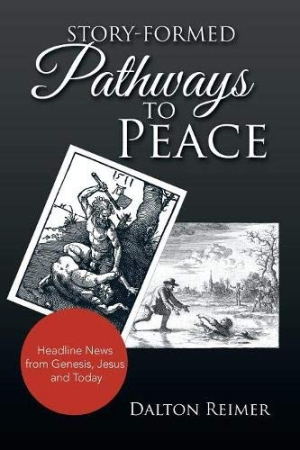Story-Formed Pathways to Peace
Headline News from Genesis, Jesus and Today
Story-Formed Pathways to Peace provides inspiration for seeking reconciliation through progressive Christian biblical commentary.
Dalton Reimer’s Story-Formed Pathways to Peace uses biblical inspiration to forward ethical commentary on contemporary challenges.
Reimer has considerable experience leading and teaching groups about conflict, violence, and peacemaking; his book draws from that background and is divided into two main sections. The first explores the book of Genesis, particularly the marriage of Abraham, the rape of Dinah, and the complicated family saga of Joseph. The second part explores the teachings of Jesus and the New Testament, again looking at themes around families, neighbors, and enemies. The book reflects a progressive Christian theology, referencing writings from thinkers including feminist biblical scholar Phyllis Trible and theologian Dietrich Bonhoeffer.
Theory sometimes overrides practical concerns here, and some difficult topics, including divorce and sexual violence, are treated with too much distance; related solutions feel too safe. Contemporary examples help to make scriptural passages feel relevant, if some anecdotes are dated—even the most current are close to a decade old. These include an examination of Jesus’s leadership alongside a relevant, but aging, story that Nelson Mandela told about shepherds and sheep with the “nimble” leading the weak.
The book is best when it poses straightforward questions, such as how “who is my family” or “an eye for an eye” apply today, and forwards Christian teachings about theological themes of hospitality or forgiveness. Written using a mixture of cultural references, an exploration of Hebrew and Greek, and theological ideas, the book’s themes and concepts work together, resulting in a unified whole. Citations are clear, with ample footnoting, source pages, and specific quotations.
The book’s point—that the Bible can be a source of inspiration for approaching conflicts and fostering strong considerations of Christian ethics—is well made. Each chapter follows a sermon-like pattern, including a brief introduction, an exploration of a biblical story, and practical applications from peace and conflict work. For example, it suggests that Jacob’s family saga provides a model of reconciliation that includes confession, forgiveness, and repentance. Such notions are familiar but are enlivened by novel images and metaphors, like a suggestion that Jesus treats tradition like a river that can be filled with either polluted water or that of pristine mountain springs. Similarly, to questions of what family means and what family members are owed, Reimer notes that, for Jesus, the golden rule extends to enemies and neighbors; they too are family in this conception.
Story-Formed Pathways to Peace provides inspiration for seeking reconciliation through progressive Christian biblical commentary.
Reviewed by
Jeremiah Rood
Disclosure: This article is not an endorsement, but a review. The publisher of this book provided free copies of the book and paid a small fee to have their book reviewed by a professional reviewer. Foreword Reviews and Clarion Reviews make no guarantee that the publisher will receive a positive review. Foreword Magazine, Inc. is disclosing this in accordance with the Federal Trade Commission’s 16 CFR, Part 255.

